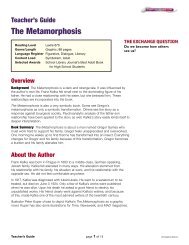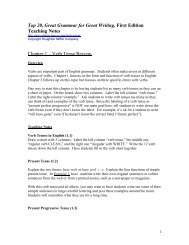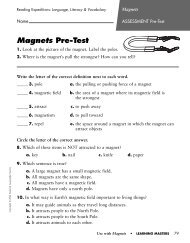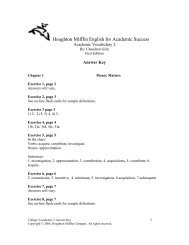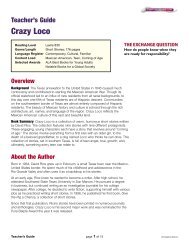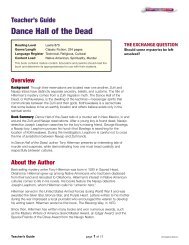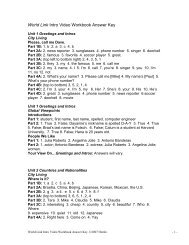English for Cabin Crew Trainer's Guide - Heinle
English for Cabin Crew Trainer's Guide - Heinle
English for Cabin Crew Trainer's Guide - Heinle
You also want an ePaper? Increase the reach of your titles
YUMPU automatically turns print PDFs into web optimized ePapers that Google loves.
UNIT<br />
LEAD IN Speaking<br />
2 Case study<br />
Write, The fi ght <strong>for</strong> the overheads on the board. Ask students<br />
what they think this refers to. Ask, Do you think this is a<br />
problem? What do you do to help?<br />
EXERCISE 1 Reading<br />
Ask students to read the text quickly and fi nd answers to the questions.<br />
Let students discuss the answers in pairs be<strong>for</strong>e discussing in open class.<br />
Answers<br />
1 the growing problems of storing hand-baggage in the overhead lockers<br />
as passengers board the aircraft<br />
2 Yes. If there is no space <strong>for</strong> their bags in the overhead lockers or under<br />
the seat in front of them, their bags will be off-loaded and put in the<br />
hold.<br />
EXERCISE 2 Reading<br />
Give students time to read through the questions. Then ask them to<br />
read the second paragraph, fi nd answers and discuss them in pairs. Get<br />
feedback in open class at the end.<br />
Answers<br />
1 people become angry; fl ight attendants are stressed because they can’t<br />
per<strong>for</strong>m their proper duties<br />
2 store small items under seats, leave space <strong>for</strong> others, free the aisles<br />
3 safety duties: checking equipment and passengers’ behaviour/needs<br />
Vocabulary in context<br />
Write the following words on the board and ask students to match them<br />
to synonyms in the text: not relaxed (stressed); large and of an awkward<br />
shape (bulky); taken off the plane (off-loaded); place where cargo is<br />
carried (hold); putting away (stowing); moving on the runway (taxiing).<br />
EXERCISE 3 Speaking<br />
The aim here is to get students talking about their personal experiences.<br />
Give students time to read through the questions and think of responses.<br />
Ask them to discuss their responses in pairs or small groups. After a few<br />
minutes, get one student from each pair or group to briefl y summarize<br />
the main points of their discussion.<br />
Pre-teaching vocabulary<br />
Check the following key adjectives: cheerful (happy and friendly);<br />
life-threatening (may result in death); diverted (when the destination is<br />
changed during the fl ight); tip (piece of advice).<br />
EXERCISE 4 and 5 Listening<br />
Give students time to read the situation and questions in exercise 4. Play<br />
the recording. Students listen, take notes, then discuss their answers in<br />
pairs. Get feedback in open class at the end.<br />
Follow the same procedure <strong>for</strong> exercise 5.<br />
Answers<br />
1 The business traveller who is serious, passengers going on holiday,<br />
maybe fl ying <strong>for</strong> the fi rst time, who are excited and nervous;<br />
passengers travelling to visit family and friends. All have different<br />
feelings.<br />
2 He was an elderly man with an obviously serious medical condition.<br />
Shon had to decide whether to allow him to travel or not. He wanted<br />
to travel. He was taken off the plane by paramedics, and a possibly<br />
serious medical incident was avoided.<br />
3 to do the job with the most professional and highest standard possible<br />
Her tips: drink plenty of water, carry a little pot of moisturizer <strong>for</strong><br />
the lips. For women, take a new bottle of nail varnish; <strong>for</strong> men,<br />
moisturizer<br />
CD1 Track 2.9<br />
1 Did you enjoy welcoming passengers?<br />
S: One of the most exciting parts of the day <strong>for</strong> me at the beginning of a fl ight<br />
was the welcoming of passengers because it was the opportunity you’d have<br />
to give a really cheerful welcome to all the different types of passengers<br />
that you’d be carrying on that fl ight and the preparation and the team work<br />
between the crew in preparation of greeting passengers was always very<br />
exciting and when people come on board there are all sorts of emotions<br />
coming with that. You’ve got the business traveller who has, you know, a<br />
frequency of travel and there<strong>for</strong>e tends to adopt a more serious approach.<br />
You’ve got the holiday maker who is very excited or a little nervous – you<br />
know, particularly with infrequent travellers – people who’ve never fl own<br />
be<strong>for</strong>e and then you’ve got those people who are travelling to visit family<br />
and friends and they’ve got different emotions again and I always saw the<br />
welcoming part as my opportunity to really welcome people on board in a<br />
positive and cheerful way showing them that, you know, they were in my safe<br />
hands really, or our safe hands as a team, collectively.<br />
2 Did you ever experience any problems when welcoming passengers?<br />
S: There was one time I remember. We were leaving Toronto and an elderly<br />
gentleman boarded the aircraft and as he boarded I said, you know, welcome<br />
on board sir, and he barely could speak, he could barely walk, although he<br />
had no assistance and he wasn’t with anybody. I showed him to his seat, but<br />
it became very apparent very quickly, like within 30 seconds to a minute, that<br />
this gentleman wasn’t very well and I wasn’t happy to take him all the way to<br />
London. He looked as though he was seriously ill. I called the paramedics who<br />
boarded the aircraft and un<strong>for</strong>tunately they had to take this gentleman off<br />
which I know he didn’t thank me <strong>for</strong> because he just wanted to get home, but<br />
it turned out that he had a serious medical condition that would have been<br />
life-threatening and it would have meant the fl ight being diverted at great<br />
cost to the airline and at great time and expense to the rest of the passengers<br />
on board. As the senior crew member on board that day, which I was, it was<br />
between myself and the paramedics and I was guided really on that decision by<br />
the paramedics – I mean I had really laid out, you know, the point that I was<br />
unhappy to take the passenger if he was sick and it was when the paramedics<br />
looked at him without any investigation they recognized that he was seriously<br />
ill, so the decision was between the two of us, but ultimately the paramedics.<br />
3 Do you have any tips <strong>for</strong> a new fl ight attendant?<br />
S: Anyone who is starting out their career as a fl ight attendant – I would say do<br />
your job with the most professional and high standard that you could possibly<br />
have. And a little tip, I think, <strong>for</strong> anyone fl ying in the air is to keep drinking<br />
plenty of water because obviously the aircraft can be fairly dehydrating and<br />
always, always carry a little pot of moisturizer <strong>for</strong> your lips because your<br />
lips tend to suffer quite a lot up in the air, so that would be my tip. Oh,<br />
and defi nitely <strong>for</strong> the ladies, a new bottle of nail varnish. For the male fl ight<br />
attendants, again moisturizer is key and drink lots of water because unless<br />
you have experience of continually working in a dehydrated cabin, you have<br />
no idea what it’s like to dehydrate which you really will do, so lots of water,<br />
drink lots of that and keep a little pack of moisturizer with you.<br />
EXERCISE 6 Speaking<br />
Ask students to work in pairs or small groups to discuss the solutions.<br />
Get feedback in open class and encourage students with interesting ideas<br />
to share with the class.<br />
ROUND UP<br />
Revise vocabulary from the unit by asking students to write<br />
words and phrases connected with the industry under the<br />
following headings:<br />
What's on a boarding pass / Objects in a cabin / Safety instructions<br />
Ask students to work in pairs to write all the words and phrases they<br />
know, or to search the unit to fi nd words and phrases to write.<br />
11



